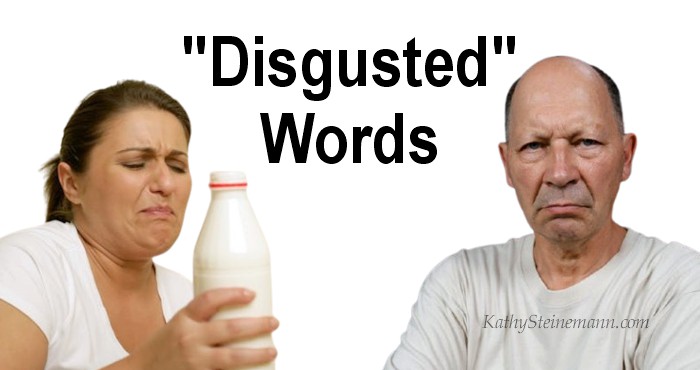
It’s Inescapable
Whether your characters are disgusted by rotten meat, a person who hasn’t bathed in months, or the results of an election; if you use the word disgusted too often, your writing will disgust readers.
This post should help you avoid the inescapable.
I wrote it in response to a request on Writers: Today It’s Your Turn to Grab the Steering Wheel.
Adjectives Are Often the First Resource We Try
Descriptors such as the following are quick and easy. Although they all tell rather than show, and some border on cliché, they function well when you need to conserve words.
The degree of disgust is subjective, and it might be affected by context. I have made a judgment call for each word, which you might want to override.
Pay attention to subtle connotations, and pick words that match your writer’s voice and vocabulary. For example, if you don’t know the meaning of squicked (feeling intense disgust), your readers might not know it either.
Know — and write for — your audience.
Mild Disgust Adjectives and Adjective Phrases
A to W
affronted, agitated, bothered, bugged, chafed, discomfited, discomposed, disconcerted, disgruntled, disheartened, dispirited, displeased, disquieted, dissatisfied, disturbed, fazed, flustered, galled, glum, irked, jarred, miffed, morose, nettled, offended, peeved, perturbed, rattled, roiled, uncomfortable, uneasy, unhappy, unnerved, unsettled, worried
Stronger Disgust Adjectives and Adjective Phrases
A to V
annoyed, bitter, chagrined, daunted, distressed, exasperated, grieved, indignant, rankled, shook, taken aback, troubled, turned off, upset, vexed
Extreme Disgust Adjectives and Adjective Phrases
A to H
about to (barf, puke, throw up, vomit), aghast, alarmed, angered, apoplectic, appalled, aquake, boiling, choleric, devastated, dismayed, distraught, dumbfounded, enflamed, enraged, fed up, filled with (animus, loathing, revulsion), flabbergasted, freaked out, fuming, furious, horrified, horror-struck
I to W
incensed, inflamed, infuriated, irate, livid, mad, mortified, nauseated, outraged, overwrought, panicked, panicky, repelled, repulsed, revolted, riled, scandalized, seething, shattered, shocked, sick, sick and tired, sickened, sore, squicked, steaming, stunned, traumatized, tremorous, tremulant, up to here, worked up, wound up
The Writer’s Lexicon series
and additional resources on my Facebook page.
Emotion Beats, Physical Manifestations, and Overt Actions
Note as you peruse the following words that the POV character (point-of-view character or character of focus) may experience sensations and muscle reactions not visible to other people in a scene. The phrases marked with an asterisk (*) are sensations that may not be visible to others.
- *nausea
- *deceleration in one’s heart rate
- *suppression of breathing
- dry heaving
- *reduced appetite
- avoidance of situation that causes the disgust
- flared nostrils
- choking
- clenching one’s jaw
- flinching
- choking, gagging, retching, and/or vomiting
- pretending to choke, gag, or retch
- giving someone the finger
- grabbing one’s hair, as though wishing to pull it out
- grimacing
- puckering one’s lips
- raising one’s upper lip
- covering one’s nose and mouth
- pinching one’s nose
- recoiling
- making offensive or insulting remarks (see next section)
- furrowing one’s brow
- narrowing one’s eyes
- wrinkling one’s nose
- ranting on social media
- sending hate mail
If you need additional beats, consult a body language dictionary. (As an Amazon Associate, I earn from qualifying purchases.)
Dialogue
Speech provides an extraordinary avenue for revealing emotion — often with a single word. Characters can show disgust via dialogue such as:
- “Ew.”
- “Yuck.”
- “Blech.”
- “Ugh.”
- “Don’t you dare come near me until you’ve steam-cleaned your armpits.”
- “I can’t stand the sight of __________.”
- “I’ve never been so turned off.”
- “I wouldn’t touch that with a ten-foot pole.”
- “You gotta be kidding. No way.”
- “That makes me want to barf.”
- “I can’t stomach __________.”
- “It makes me sick to my stomach.”
- “Never in a million years.”
- “It makes my skin crawl.”
- “That leaves a bad taste in my mouth.”
- “Gag me with a spoon. Then bury me.”
- “It’s too late to say you’re sorry.”
- “You know where you can shove it.”
- “Shame on you.”
- “Where did you learn to cook? Spoiled milk would smell better than this.”
- “That’s a fine how-do-ya do.”
- “That sucks big time.”
- “I wouldn’t even give that despicable thing to my mother-in-law.”
- “Your name is mud. No, it’s muck, filth, earthworm crap.”
- “That’s grody to the max.”
Clichés and Idioms
A college professor isn’t likely to use some of the following phrases, but a teenager might. Taylor your narrative accordingly.
- at sixes and sevens
- beside oneself
- cheesed off
- creeped out
- discombobulated
- filled with the heebie-jeebies
- gnashing one’s teeth
- graveled
- grossed out
- het up
- knocked for six
- spitting mad
- ticked
- ticked off
- up in arms
The Writer’s Lexicon series
and additional resources on my Facebook page.
Discover more from KathySteinemann.com: Free Resources for Writers
Subscribe to get the latest posts sent to your email.

A great list. Many thanks.
My pleasure, Vivienne!
Important word with so many wonderful variations, lol. 🙂
A sarcastic smile? [wink]
Thanks. Now I can say how I’m feeling now in a million more ways. 😉
LOL. You’re welcome, Amy. I’m sure there are millions of people who agree with you.